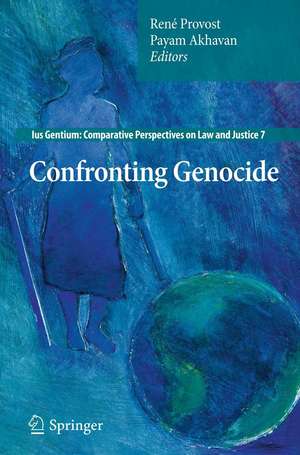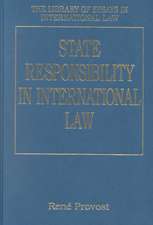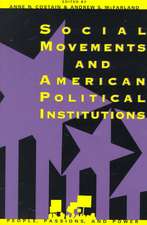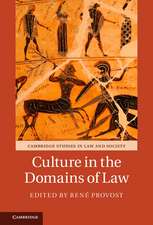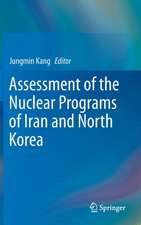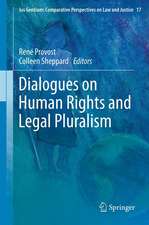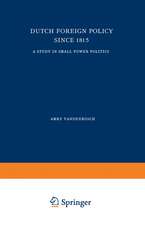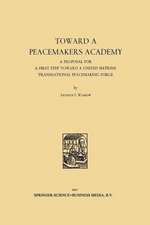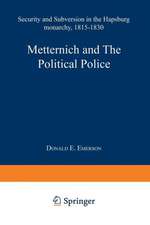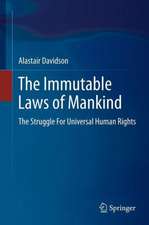Confronting Genocide: Ius Gentium: Comparative Perspectives on Law and Justice, cartea 7
Editat de René Provost, Payam Akhavanen Limba Engleză Paperback – 2 feb 2012
| Toate formatele și edițiile | Preț | Express |
|---|---|---|
| Paperback (1) | 949.23 lei 43-57 zile | |
| SPRINGER NETHERLANDS – 2 feb 2012 | 949.23 lei 43-57 zile | |
| Hardback (1) | 955.70 lei 43-57 zile | |
| SPRINGER NETHERLANDS – 30 noi 2010 | 955.70 lei 43-57 zile |
Din seria Ius Gentium: Comparative Perspectives on Law and Justice
- 20%
 Preț: 1128.16 lei
Preț: 1128.16 lei - 20%
 Preț: 1565.18 lei
Preț: 1565.18 lei - 18%
 Preț: 1115.28 lei
Preț: 1115.28 lei - 18%
 Preț: 904.28 lei
Preț: 904.28 lei - 18%
 Preț: 1001.81 lei
Preț: 1001.81 lei -
 Preț: 180.18 lei
Preț: 180.18 lei - 24%
 Preț: 787.31 lei
Preț: 787.31 lei - 18%
 Preț: 1115.28 lei
Preț: 1115.28 lei - 15%
 Preț: 635.31 lei
Preț: 635.31 lei - 18%
 Preț: 1108.67 lei
Preț: 1108.67 lei - 18%
 Preț: 1007.97 lei
Preț: 1007.97 lei - 18%
 Preț: 784.79 lei
Preț: 784.79 lei - 18%
 Preț: 1223.11 lei
Preț: 1223.11 lei - 18%
 Preț: 891.02 lei
Preț: 891.02 lei - 18%
 Preț: 1009.40 lei
Preț: 1009.40 lei - 18%
 Preț: 1005.74 lei
Preț: 1005.74 lei - 18%
 Preț: 1014.89 lei
Preț: 1014.89 lei - 18%
 Preț: 896.70 lei
Preț: 896.70 lei - 15%
 Preț: 641.85 lei
Preț: 641.85 lei - 18%
 Preț: 779.71 lei
Preț: 779.71 lei - 18%
 Preț: 1010.79 lei
Preț: 1010.79 lei - 18%
 Preț: 1010.03 lei
Preț: 1010.03 lei - 18%
 Preț: 950.52 lei
Preț: 950.52 lei - 15%
 Preț: 638.76 lei
Preț: 638.76 lei - 18%
 Preț: 947.50 lei
Preț: 947.50 lei - 20%
 Preț: 564.78 lei
Preț: 564.78 lei - 18%
 Preț: 1115.14 lei
Preț: 1115.14 lei - 18%
 Preț: 939.42 lei
Preț: 939.42 lei - 15%
 Preț: 635.80 lei
Preț: 635.80 lei - 15%
 Preț: 637.59 lei
Preț: 637.59 lei - 15%
 Preț: 643.65 lei
Preț: 643.65 lei - 24%
 Preț: 809.18 lei
Preț: 809.18 lei
Preț: 949.23 lei
Preț vechi: 1157.60 lei
-18% Nou
Puncte Express: 1424
Preț estimativ în valută:
181.69€ • 197.42$ • 152.72£
181.69€ • 197.42$ • 152.72£
Carte tipărită la comandă
Livrare economică 21 aprilie-05 mai
Preluare comenzi: 021 569.72.76
Specificații
ISBN-13: 9789400739864
ISBN-10: 9400739869
Pagini: 396
Ilustrații: XX, 374 p.
Dimensiuni: 155 x 235 x 25 mm
Greutate: 0.55 kg
Ediția:2011
Editura: SPRINGER NETHERLANDS
Colecția Springer
Seria Ius Gentium: Comparative Perspectives on Law and Justice
Locul publicării:Dordrecht, Netherlands
ISBN-10: 9400739869
Pagini: 396
Ilustrații: XX, 374 p.
Dimensiuni: 155 x 235 x 25 mm
Greutate: 0.55 kg
Ediția:2011
Editura: SPRINGER NETHERLANDS
Colecția Springer
Seria Ius Gentium: Comparative Perspectives on Law and Justice
Locul publicării:Dordrecht, Netherlands
Public țintă
ResearchCuprins
Moving From Repression to Prevention of Genocide; Payam Akhavan and René Provost.- PART I: RECONCEPTUALIZING GENOCIDE.- 1 From Irish Famine to Congo Reform: Nineteenth-Century Roots of International Human Rights Law and Activism; Ben Kiernan.- 2 Darfur: Genocidal Theory and Practical Atrocities; Gérard Prunier.- 3 Sovereignty as Responsibility for the Prevention of Genocide; Francis M. Deng.- 4 Citizenship, National Identity, and Genocide; Douglas Greenberg.- 5 Incitement, Prevention and Media Rights; Mark Thompson.- PART II: UN/PREVENTED GENOCIDE.- 6 Some Problems of Genocide Prevention; Yehuda Bauer.- 7 Preventing Genocide Through Military Intervention: Peacekeeping Troops in he “Responsibility to Protect” Era; Wiebe Arts.- 8 Combating State-Sanctioned Incitement to Genocide: A Legal and Moral Imperative; Irwin Cotler.- 9 Facing History: Denial and the Turkish National Security Concept; Taner Akçam.- 10 The Role of Economic Sanctions in Deterring Serious Human Rights Violations: South Africa, Iraq and Darfur; Richard J. Goldstone.- 11 Expectation of Prosecuting the Crimes of Genocide in China; Wenqi Zhu and Binxin Zhang.- PART III: PREVENTION BEYOND THE STATE.- 12 Not “Lambs to the Slaughter”: A Program for Resistance to Genocidal Law; Frédéric Mégret.- 13 Privatizing Humanitarian Intervention? Mercenaries, PMCs and the Business of Peace; Krzysztof Kotarski and Samuel Walker.- 14 Creating the Outcry: Citizen-Driven Political Will for Genocide Prevention in the US Context; Rebecca J. Hamilton.- 15 The Role of the International Community in Assisting the International Criminal Court to Secure Justice and Accountability; Luis Moreno-Ocampo.- 16 International Justice: From the Twilight to the Dawn? International Criminal Court Prosecutor Luis Moreno-Ocampo at McGill University; Noah Weisbord.- 17 The Politics of Legal Accountability and Genocide Prevention; Catherine Lu.- 18 A Psychological Investigation of Individual and Social Transformations in Post-Genocide Rwanda; Jobb Arnold.- 19 Creating the Essential Middle Ground: Using Media to Enhance Tolerance and Co-Habitation in Africa; Mary Kimani.- References.- Index.
Recenzii
“The essays reflect a range of disciplinary perspectives and approaches, including history, sociology, psychology, journalism, international relations, and law, unified around a theme of genocide prevention … . Contributions vary from the theoretical, to the descriptive, to the practical based on personal experiences. The book is thus likely to appeal to a wide audience interested in engaging with both theoretical and practical perspectives on the dynamics of genocide and what we might focus upon in order to prevent its recurrence.” (Joanna Kyriakakis, Criminal Law and Philosophy, Vol. 10, 2016)
Textul de pe ultima copertă
“Never again” stands as one the central pledges of the international community following the end of the Second World War, upon full realization of the massive scale of the Nazi extermination programme. Genocide stands as an intolerable assault on a sense of common humanity embodied in the Universal Declaration of Human Rights and other fundamental international instruments, including the Convention on the Prevention and Punishment of the Crime of Genocide and the United Nations Charter. And yet, since the Second World War, the international community has proven incapable of effectively preventing the occurrence of more genocides in places like Cambodia, Yugoslavia, Rwanda and Sudan. Is genocide actually preventable, or is “ever again” a more accurate catchphrase to capture the reality of this phenomenon? The essays in this volume explore the complex nature of genocide and the relative promise of various avenues identified by the international community to attempt to put a definitive end to its occurrence. Essays focus on a conceptualization of genocide as a social and political phenomenon, on the identification of key actors (Governments, international institutions, the media, civil society, individuals), and on an exploration of the relative promise of different means to prevent genocide (criminal accountability, civil disobedience, shaming, intervention). The essays grew out of the first Echenberg Family Conference on Human Rights at the McGill Centre for Human Rights and Legal Pluralism in Montréal, Canada.
Caracteristici
First comprehensive treatment of genocide prevention Anchored in the study of past and current genocide Interdisciplinary approach to identify concrete solutions
